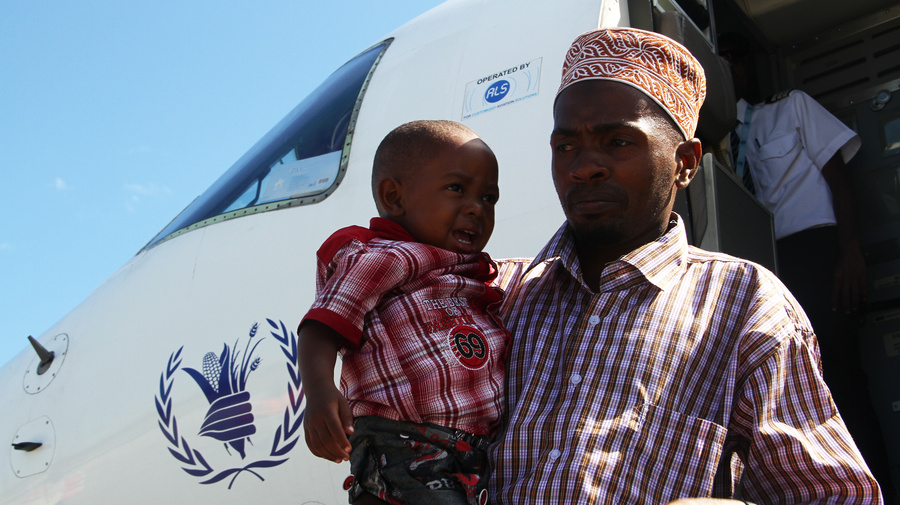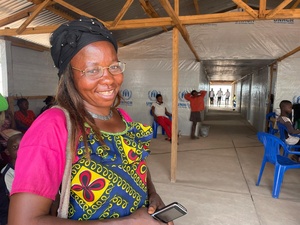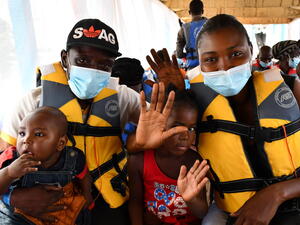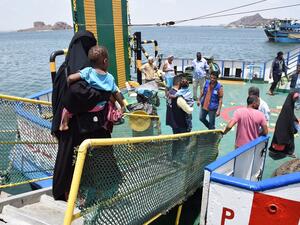From Mogadishu with love: a refugee's dream to see Zanzibar again
From Mogadishu with love: a refugee's dream to see Zanzibar again

Mohammad Adam Suleiman carries his son off the plane that has brought him back to Zanzibar after 11 years in exile. Zanzibar, Tanzania.
MOGADISHU, Somalia, July 10 (UNHCR) - Eleven years ago, Mohamed Adan Suleiman fled his home in Zanzibar's Pemba Island, fearing for his life during the post-election violence that ravaged Zanzibar, a territory of Tanzania on the Indian Ocean coast.
"It was a hotly contested election and with that came tension. Opposition forces protested against the results; people went to the streets burning everything," Suleiman recalled of the events in early 2001. "Young men were beaten and left for dead. Women and girls were raped . . . All around us was the smell of death."
Suleiman said he decided to leave, "when I heard they were coming at night, house to house, for men like me, I decided to run for my life. I worried for my family but I feared for my life," he said. He eventually made his way to Mogadishu in Somalia, after an arduous journey by boat and foot.
But after living in one of the most dangerous cities on earth for more than a decade, and after being assured things have changed in Zanzibar, Suleiman told UNHCR earlier this year in the Somali capital that he was ready to return to his home and couldn't wait to see his family.
"Life as a refugee is hard, particularly in Mogadishu. Imagine yourself as a foreigner living in a place where there is no security and limited job opportunities. The jobs we have don't pay us much," said Suleiman, who worked as a lavatory cleaner. "What can I do? My two boys need to eat."
His dream came true last Friday, when Suleiman, his Somali wife, their two sons and 38 other Tanzanian refugees from Zanzibar were flown home on two small aircraft chartered by UNHCR and warmly welcomed by family and Tanzanian officials on arrival. He told UNHCR he wanted to start a new life on Pemba Island, and his enthusiasm was shared by his family.
The returning refugees have been given a reintegration package, including a cash grant and four months' food supply as well as basic shelter and household items. Together with the Tanzanian authorities, UNHCR will be monitoring the returned families to ensure their successful reintegration.
Suleiman's journey home was a far cry from the ordeal that brought him to Mogadishu all those years ago. The first stage of his flight from Zanzibar saw him board a small crowded boat of like-minded young men and head up the coast to the port of Mombasa in Kenya.
"Many thoughts crossed my mind as we sailed further and further from the shore. I felt I was in a bad dream, but that I would wake from it. At other times I thought I'd made a huge mistake by leaving my parents behind. If I was a good swimmer, I would have dived into the sea and gone back home," Suleiman laughed.
But he had made the decision and could not turn back. He worried about being sent back to Tanzania, he worried about how to tell his family he was okay. "One of my friends suggested we seek out an aid agency to assist us. Miraculously, we happened upon UNHCR, who helped us. We were registered as refugees," Suleiman explained.
He was taken to Ifo camp in the sprawling Dadaab refugee complex in north-east Kenya. Most of the inhabitants in what is today the world's largest refugee site are from neighbouring Somalia. Suleiman lived with his Zanzibari friends in a traditional shelter and was given a ration card for food and aid.
But he spent much of the time worrying. "Nights were the most difficult. Never mind reliving the nightmare that we left at home, but just the fear of being caught, that made all of us sleep with one eye open. We often feared being taken back home. We didn't feel safe, so we decided to leave [later in 2001]."
His group crossed the arid terrain into nearby Somalia, which has essentially been in turmoil since the overthrow of the Siad Barre government in 1991. Their journey took many days, much of it on foot, and brought them to Mogadishu via the southern towns of Dobley and Afmadow.
Somalia was meant to be just a pit stop in their journey to safety. "We had no intention of staying here [in Mogadishu]. Our aim was to flee to other countries like Sudan or Ethiopia," Suleiman said. They approached different aid agencies and asked for help in getting out of Somalia - to no avail. "Days and months have now turned into 11 years."
He has been living with a group of around 20 Zanzibari families in an old building on the outskirts of the city. Each of the small dimly lit rooms must accommodate at least six people. They have little protection in the building from the elements or danger. Some people sleep in the corridors.
And next to this home is a noisy market place abuzz with all manner of buying and selling. The Zanzibaris try to make a living here, helped by their children, who have been missing out on much of their education.
But while Suleiman was delighted to be going home, he had good things to say about the people he had lived among in Mogadishu for so long and the kindnessess he had received as an exile. He said it was a city of contrasts. But not a place for his two boys to grow up in.
The remainder of the Tanzanian refugee community in Mogadishu, totalling some 70 people, told UNHCR that they will wait and see how the situation unfolds for those who went back last week before making a final decision on their return. UNHCR continues to keep in close contact with them.
By Faith Kasina in Mogadishu, Somalia








